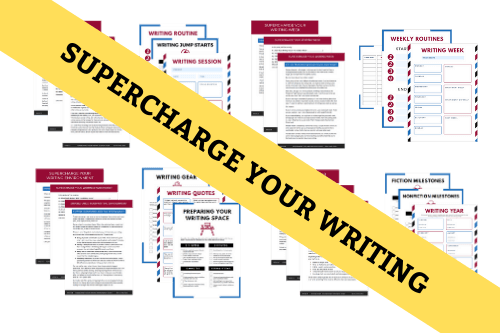Seven Ways to Make More Progress With Your Writing (& How to Track It)

How’s your writing been going over the past few months?
Some writers find that they have a burst of writing enthusiasm, getting lots done quickly, before their enthusiasm peters out. Others feel that they never really get into the writing groove, so they’re constantly struggling to gain momentum … and never making very much headway.
Whatever your writing goals are, you’ll struggle to meet them if you’re only writing sporadically. But it can be really tough to fit much writing in, especially when you might be struggling with a lack of motivation.
If you’re not currently making consistent progress with your writing, these are some things that can help:
#1: Set Aside Regular Time to Write Each Week
This is so much easier said than done, I know … but the very best way to make progress with your writing is to put aside regular time to write, every week.
I don’t think you need to write every day (in fact, I think that advice can be actively unhelpful). However, if you’re not writing at least once a week, most weeks, it’s hard to keep momentum.
When you’re planning your writing time, you might want to think about when in the day you’re at your most focused. You might also want to try out shorter versus longer writing sessions: I cover the different advantages each of those in Supercharge Your Writing Session.
Tip: If the idea of a spare hour or even 30 minutes to write seems laughable, could you try really short sessions? Even 15 minutes is long enough to write.
#2: Plan Ahead for Longer Writing Sessions
Although you might not be able to write for very long at a stretch during a regular week, can you carve out some time for occasional longer writing sessions? This can be a great way to make serious progress and gather momentum – helping you stay on track during your regular shorter sessions.
If you plan far enough ahead, it’s often possible to get a whole afternoon or even a whole day or more of writing time. Obviously this depends a bit on your circumstances, but if you look a month or so ahead in your calendar, could you block out all or most of a weekend day for writing?
Tip: The further ahead you plan, the more time you can likely carve out. If you have children or caring responsibilities, planning months ahead gives you plenty of time to arrange help.
#3: Tackle One Big Project at a Time
Do you have multiple projects on the go? Many writers do. It’s not necessarily a problem to be working on several things at once – but if you feel that you’re not really making progress with anything, it’s time to pick one project.
Choose a single big project that you want to focus on for the next three months. You can certainly work on other short pieces too, but one novel at a time, or one blog at a time is a better way to make progress than constantly shuffling between them.
Tip: Need to work on two big projects at the same time? Try having different days of the week, or times of day, for each. For instance, you might do freelancing work on Mondays to Thursdays, and work on your novel on Fridays.
#4: Take Proper Breaks from Writing
All writers need a break from time to time. Maybe you’re going through a really busy time, or perhaps you’re just not feeling at all enthusiastic about writing.
Take a break. Just make it a proper, planned one – not a break that happens by accident when you skip one writing session, then another, and finally realise you’ve written nothing for months on end. You might want to take anything from a week to a few months off from writing.
Tip: Before you take a break, make some notes to yourself about what you were working on and where you’d got to with everything, and put them somewhere easy to find – like at the end of your draft-in-progress document.
#5: When You Are Writing, Focus
If your writing time is limited, you’ll want to make the most of it. That means finding ways to focus – so you’re not getting distracted.
Some writers find it helps to keep their writing sessions short. You may also want to try things like switching off your internet connection, or listening to music as you write. For lots more guidance and tips on focus, check out Supercharge Your Writing Session.
Tip: Need an instant focus boost? Take a few slow breaths, and write down the one thing you want to achieve in the next 30 minutes. Remove or turn off any distractions (e.g. close browser windows or turn off the TV), then set a timer for 30 minutes and start writing.
#6: Get to Know Other Writers
It’s hard to make steady progress completely alone. You might have a friend or family member who’s a great support with your writing, but unless they’re a writer too, they may struggle to completely understand your writing life.
This is where other writers come in. You may want to join a writers’ group for feedback on your writing itself – or you may simply want to have some writers who you can talk to and share your progress with.
Tip: My Facebook group, the Aliventures Club, is completely free and open to anyone who’s worked with me or bought anything from me (such as my ebooks). It’s a great place to chat about writing and to get some encouragement and support. I’d love to see you in there.
#7: Find a Balance of Learning and Doing
Are you spending a lot of time reading about writing, or learning about writing, without actually writing? I know some writers who always seem to be taking yet another course, or who are always on the verge of starting their blog … just as soon as they’ve finished learning the next thing.
It’s really tough to find the right balance of “learning” and “doing” as a writer. We all need to spend some time reflecting on our writing, learning from others, and trying new techniques … but not at the expense of making forward progress.
Tip: If you’re someone who has a lot of writing books and courses, promise yourself that you won’t start a new one until you’ve (a) finished the ones you already have and (b) spent some time putting into practice what you’ve learnt from them.
How to Track Your Writing Progress
How do you track your writing progress? Different writers like different methods: some count words, others keep note of time spent writing, and some simply look at the writing milestones that they’ve achieved.
You might want to:
- Record your word counts each day in a spreadsheet: that way, you can total them up as the weeks and months go by. You can also look for patterns (e.g. maybe you always seem to get more written at the start of the week than the end of the week).
- Keep an achievements book where you log what you’ve achieved each month. This can be great to look back on as time goes by, because it lets you see how small achievements led to bigger ones. Mine goes back to the beginning of 2008 and my very first freelance assignments.
- Write down what you’ve accomplished at the end of each week. I do that when previewing the week ahead. It’s a good way to celebrate what you did get done, even if it wasn’t quite as much as you hoped.
- Track the number of short stories you submit. It’s a good idea to track where you’re submitting work anyway (so you can chase up if needed and so you know which pieces are where).
- Track your writing income – if your main goal is to make a living writing, you might want to keep track of what you’re earning each day or week.
If you’re not sure where to begin with tracking your writing progress, here’s a simple way to start:
- Set a weekly goal, such as “write for 2 hours” or “write a blog post”.
- Track your progress, by noting down how long you wrote or how far you got during each writing session.
- Review how you did at the end of the week – and set a new goal for the following week with this in mind.
Go Further, Faster, with Supercharge Your Writing
Make sure you check out my Supercharge Your Writing series for lots more tips on making great progress with your writing.
All four ebooks in the series will help you get more writing done (and enjoy it more too) … and they’re on sale until the end of Friday 26th February.
About

I’m Ali Luke, and I live in Leeds in the UK with my husband and two children.
Aliventures is where I help you master the art, craft and business of writing.
Start Here
If you're new, welcome! These posts are good ones to start with:
Can You Call Yourself a “Writer” if You’re Not Currently Writing?
The Three Stages of Editing (and Nine Handy Do-it-Yourself Tips)
My Novels

My contemporary fantasy trilogy is available from Amazon. The books follow on from one another, so read Lycopolis first.
You can buy them all from Amazon, or read them FREE in Kindle Unlimited.



0 Comments